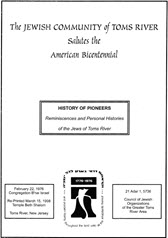THE PYENSON, DARDICK, AND ROBINSON FAMILIES
Papa and mama Levich and Ida Pyenson, with Jacob and Mildred, aged 7 and 5, moved to a farm in Toms River in October, 1927. They left a thriving hand laundry business in New York City to try to regain Papa's health on a farm.
The farm was (and is) on Old Freehold Road, just a little south of the Toms River Jewish Community center. Even though there were few neighbors around we were not lonely. Mama's sister and brother-in-law, Clara and Harry Haft, were partners on the farm when it was bought. Our cousins, Izzy, Edna and Helen were all in our age group. City relatives visited often with many more cousins. There was always someone to play with.
Needless to say the fresh farm air did not cure Papa's leukemia. He died in July 1928. Over the next few years the Haft family moved to the the next farm across the street, and Mama married Harry Dardick, a second cousin.
One of the reasons the Pyensons and Hafts chose the farms they bought was their closeness to the Jewish Community Center. Thus the Jewish Community Center became the focus for all our social activities. Harry and Ida Dardick never put aside their responsibilities to the Jewish Community Center. Harry held many offices and Ida worked in the Ladies Auxiliary throughout all its existence.
The struggle on the farms is well documented. The work was hard, the hours were never-ending and the financial returns were small. But there is a lot to be said for living in a small Jewish Community. The early Jewish farm families devoted themselves to giving their children what they deemed was important. They established a Sholem Aleichem Folk Shule where we, the children learned to read and write Yiddish. We Learned Jewish History. We gained insight into our Jewish Holidays. We learned Jewish songs. We recited Jewish poetry. We listened to the literature of Sholem Aleichem and I. L. Peretz. Our parents created an identity and haven for us in a hostile world.
The adults meanwhile struggled to survive harsh economic conditions. They organized purchasing co-operatives, the White Oak Poultrymen's Cooperative for equipment and the F. L. F. for buying feed, and the egg marketing co-operative FEPCU, (the Federated Egg Producers' Co-operative Association, Inc). The local Credit Union was also established in the 1930's to ease the credit squeeze.
The 1940's brought great changes to the area. Because of WWII, egg prices rose sharply. Farms expanded. Refugees from Nazi persecution settled on farms. City workers sought a new way of life and came to the farming area. The Jewish Community Center grew by leaps and bounds. Politics in the Community Center became almost unruly for awhile. Different factions developed. Personal animosities developed. But time smoothed out the problems and the Jewish Community Center survived.
One of the big fights in the Community Center revolved around its name. When the Community was established it was called the Toms River Community of Jewish Farmers. As the membership dwindled, a group proposed to omit Farmers and call the organization the Toms River Jewish Community Center. Sentiment lost and the name was changed.
Meanwhile, we, the second generation , grew up and married. With a great sense of adventure we married "out of our home town". The Toms River young people and the Lakewood young people found each other. I married Ephraim Robinson, from Lakewood. Effie took his place in the Community and served the co-operative movement well during our farming years.
When farming fell to pieces in the 1960's, Effie went to work for the Farmers Home Administration, part of the U. S. Department of Agriculture, and I went to Douglass College in New Brunswick to become a speech therapist. Thus the occupations of the Jewish population in the Toms River area changed from a farming population to a non farming population, but the interest in Jewish affairs has remained strong. The need to identify with and work for Israel seems to exist in enouph people to provide leadership for both the Congregation B'Nai Israel and the Toms River Jewish Community Center and to see that we have United Jewish Appeals and Bond Drives and many other Jewish activities. This is what makes living in this area worth-while.
Mildred Robinson
